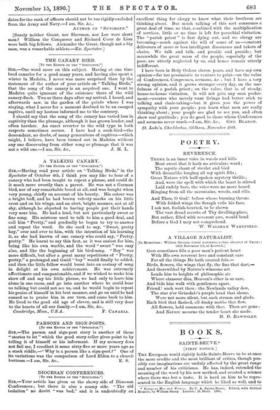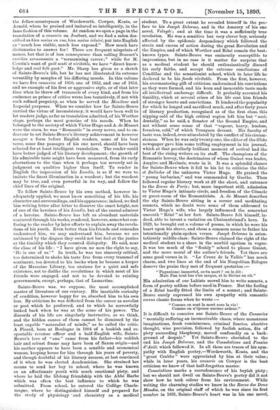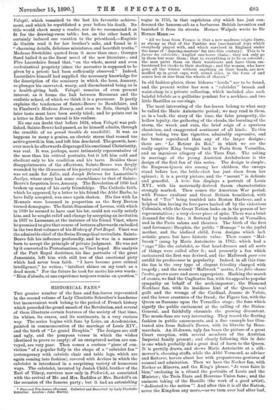BOOKS.
SAINTE-BEUVE.*
[FIRST NOTICE.]
THE European world rightly holds Sainte-Beuve to be at once the most erudite and the most brilliant of critics, though pos- sibly our imaginations are unduly affected by the great range and number of his criticisms. He has, indeed, extended the meaning of the word by his new method, and created a science where there was but a taste. It is hard on him to be repre- sented in the English language which he liked so well, and to • Essays on Men and Women. By C. A. Sainte.Renve. Edited, with Critical Memoir, by William Sharp. London: D. Stott. IWO.
the fellow-countrymen of Wordsworth, Cowper, Keats, or Arnold, whom he praised and imitated so intelligently, in the lame fashion of this volume. At random we open a page in the translation of a causerie on Joubert, and we find a salon des- cribed as bien moms en vue, bien moms eclairs, put into English as "much less visible, much less exposed." How much have dictionaries to answer for ! There are frequent misprints of names, but that is of less consequence than calling Bossuet's carriers sermonnaire a "sermonising career;" while for M. Cousin's want of goilt senti et veritable, we have "direct know- ledge and real felt gust." Mr. Sharp has given us a sketch of Sainte-Beuve's life, but he has not illustrated its extreme versatility by samples of his differing moods. In this volume we have five causeries of 1850, one of 1852, and one of 1854, and no example of his first or aggressive style, or of that later time when he threw off trammels of every kind, and from his eminence as prince of critics wrote less tentatively, if not with such refined propriety, as when he served the Moniteur and Imperial purposes. When we consider how far Sainte-Beuve carried the virtue of inconsistency, it would have been well to let readers judge, as far as translation admitted, of his Werther stage, perhaps the most genuine of his moods. When he belonged to the society of which Victor Hugo and A. de Musset were the stars, he was " Romantic " in every nerve, and to en- deavour to set Sainte-Benve's literary achievement in however meagre a form before English readers, some of his best verse, some fine passages of his one novel, should have been selected for at least intelligent translation. The reader could have better judged of his literary development : the growth of his admirable taste might have been measured, from its early aberrations to the time when it perhaps too severely sat in judgment on qualities higher than itself. To render in English the impression of his Landis, is as if we were to imitate the finest illumination in a woodcut ; but the woodcut may be true, and even powerful in its way, and follow the chief lines of the original.
To follow Sainte-Beuve by his own method, however in- adequately applied, we must know something of his life, his character and surroundings, and his appearance; indeed, we find him writing letter after letter to discover the exact height, not of one of the heroines of his Lundis, but of the casual admirer of a heroine. Sainte-Beuve has left us abundant materials scattered through his works, rendered, however, somewhat con- fusing to the reader by later efforts to explain away the revela- tions of his youth. Even better than his friends and comrades understood him, we may understand him, because we are unbiassed by the disgust they could not but feel at the justice or the timidity which they counted disloyalty. He said, near the close of his life : " I have given no men the right to say, He is one of us.' " In truth, he was too sincerely critical, too determined to shake his taste free from every trammel of sentiment, too devoted to his books when he became a keeper of the Mazazine Library, too anxious for a quiet and safe existence, not to dislike the revolutions in which most of his friends were engaged, and not to be devoted to existing governments, except, perhaps, that of Lamartine.
Sainte-Beuve was, we suppose, the most accomplished master of literature of our century. His insatiable curiosity of erudition, however happy for us, absorbed him to his own loss. By criticism he was deflected from the career as novelist or poet which he preferred, and to which he sorrowfully looked back when he was at the acme of his power. The discords of his life are singularly instructive, as we think, and the hidden causes of them cannot be dismissed by the least capable " naturalist of minds," as he called the critic. A Picard, born at Boulogne in 1804 of a bookish and re- spectable revenue officer and a half-English wife, Sainte- Beuve's love of " ana " came from his father—his reddish hair and robust frame may have been of Saxon origin—and his mother appears to have been a sensible and economical woman, keeping house for him through his years of poverty, and though doubtful of his literary success, at last convinced of it when he was elected Academician. She strained her means to send her boy to school, where he was known as an affectionate youth with much emotional piety, and where he laid the lifelong friendship with the Abbe Barbe which was often the best influence to which he was submitted. From school, he entered the College Charle- magne, where he distinguished himself and prepared for the study of physiology and chemistry as a medical
student. To a great extent he revealed himself in the pre- face to his Joseph Delorme, and in the Amaury of his one novel, Volupt ; and at the time it was a sufficiently true revelation. He was a sensitive but very clever boy, seriously affected by the epidemic despondency which followed the strain and excess of action during the great Revolution and the Empire, and of which Werther and Rene remain the best.. known types. Sainte-Beuve was eminently susceptible to impressions, but in no case is it matter for surprise that as a medical student he should enthusiastically discard his early faiths, and accept the extreme conclusions of Condillac and the sensationist school, which in later life he declared to be his fonds veritable. From the first, however, his overmastering gift of criticism undermined his convictions as they were formed, and his keen and inexorable taste made all intellectual anchorage difficult. It probably accented his timidity, which at several crises of his life cost him friends of stronger hearts and convictions. It hindered the popularity for which he longed and sacrificed much, and after forty years of literary production, recognised as of the first class, this nipping cold of the high critical region left him but " acci- dentally," as he said, a Senator of the Second Empire, and not without some sense of that "vapour, heavy, hneless, formless, cold," of which Tennyson dreamt. His faculty of taste was, indeed, over-stimulated by the conflict of his circum- stances. When he was only twenty-one, the editor of the Globe newspaper gave him some trifling employment in his journal, which at that peculiarly brilliant moment of revival had the best of the rising writers on its staff. The champions of the Romantic heresy, the doctrinaires of whom Guizot was leader, Ampere and Merimee, wrote in it. It was a splendid chance for Sainte-Beuve when it fell to his lot to criticise the Odes et Ballades of the unknown Victor Hugo. He praised the " young barbarian," and was commended by Goethe. Then followed regular literary work at the sheet, and entrance to the Revue de Paris ; but, more important still, admission to Victor Hugo's intimate circle, and freedom of the Cenacle or guest-room of the Romanticists. A. de Musset describes the shy Sainte-Beuve sitting in a corner and meditating sonnets, which no doubt were some of them addressed to Victor Hugo's wife, who largely influenced the somewhat uncouth " Rene " at her feet. Sainte-Beuve felt himself, in- deed, able to invent a variation on Chateaubriand's hero. In 1829, he brought out a volume of poems, in which he wore his heart upon his sleeve, and chose a common name to father his intentionally plain-spoken verses. Joseph Delorme is osten- tatiouely middle-class : Sainte-Beuve claimed the right of the medical student to a share in the morbid egotism in vogue_ Itwas too much of the " fleshly " school to please Guizot, and the more moral of the author's friends. Yet there are some good verses in it. "Le Creux de la Vallee" has much charm, and two lines at the end of his Neapolitan Eclogue- deserve the praise they met of frequent quotation :—
" Paga,nisme immortel, es-tn mort P on is dit : Male; Pan tout bas s'en moque, et la Sirene en rit."
His admiration of our Lakists moved him to write sonnets, a form of poetry seldom before used in France. But the feeling of a Rene hardly fitted the limits of a sonnet ; and Sainte- Beuve surely expressed his own sympathy with romantic- versus classic forms when he wrote :- "Comma on sent la mort sons In vie!
Comma on n'epouse aucune ardeur."
It is difficult to conceive our Sainte-Beuve of the Canaries- " mentally suffering an inconceivable chaos, where monstrous imaginations, fresh reminiscence, criminal fancies, abortive thought, wise prevision, followed by foolish action, fits of piety succeeding blasphemy, moved confusedly on a back- ground of despair." Yet Sainte-Beuve cherished to the end his Joseph Delorme, and the Consolations and Pennies d'Aoat, which followed it. In all these are traces of his sym- pathy with English poetry,—Wordsworth, Keats, and the " great Crabbe " were appreciated by him at their value; while in later years, his causerie on Cowper is the best criticism we know of that half-forgotten master.
Consolations marks a recrudescence of his boyish piety ; but we should not dwell on Sainte-Beuve's poetry did it not show how he took colour from his environment. While writing the charming studies we know in the Revue des Deux Mondes, on the original staff of which he was since its first number in 1831, Sainte-Beuve's heart was in his one novel; Volupte, which remained to the last his favourite achieve- ment, and which he republished a year before his death. Its title would check many a reader, nor do we recommend it as fit for the drawing-room table ; but, on the other hand, it certainly induced one vocation to the priesthood,—Eugenie de Guerin read it for her brother's sake, and found in it "charming details, delicious miniatures, and heartfelt truths." Madame Swetchine quoted from it more than once ; Georges Sand hailed it as the finest novel of the new literature ; and Pere Lacordaire found that, "on the whole, moral and even ecclesiastical propriety (since the narrative is supposed to be given by a priest) had been sufficiently observed." Indeed, Lacordaire himself had supplied the necessary knowledge for the description of the seminary in which the hero, Amaury, re-plunges his enervated, weary, and disenchanted being as in a health-giving bath. Volupte remains of even present interest, as it forms the link between Rousseau and the realistic school, of which we think it is a precursor. It partly explains the tenderness of Sainte-Beuve to Bandelaire, and to Flaubert's Madame Bovary, and even to Zola, though his later taste must have been sorely tried; and he points out in a letter to Zola how unreal is his realism.
No one can doubt that before 1834, when Volupte was pub- lished, Sainte-Beuve had passed, as he himself admits, through the crucible of un grand trouble de sensibilite. It was, as happens to many a genius, an electric storm that roused too active growth in him, and left him desolated. The growth, how- ever much he afterwards disparaged his emotional Christianity, was real. It was, perhaps, more intimately representative of the man than his critical portraits, but it left him cold and obedient only to his erudition and his taste. Besides these disappointments of the affections, Sainte-Beuve was deeply wounded by the ill-success of his poetry and romance. Volupte was set aside for Lelia, and Joseph Delorme for Lamartine's Jocelyn, whose story had some resemblance to that of Sainte- Beuve's forgotten hero, Amaury. The Revolution of 1830 had broken up many of his early friendships. The Catholic faith, which he appeared, by a letter to his friend the Abbe Barbe, to have fully accepted, was once again shaken. His ties with La Mennais were loosened in proportion as the fiery Breton turned demagogue. The Saint-Simonism of Leroux, with which in 1830 he seemed to have cast his lot, could not really satisfy him, and he sought relief and change by accepting an invitation in 1837 to Lausanne, at the instance of his friend Vinet, where he promised to give that course of lectures afterwards embodied in the two first volumes of his History of Port Royal. Vinet was the admirable chief of the Swiss Evangelical revivalists. Sainte- Bettye felt his influence profoundly, and he was in a manner born to accept the principle of private judgment. He was not by it converted to Protestantism, as Vinet hoped. His analysis of the Port Royal doctrines, his fine portraits of the great Jansenists, left him with still less of that emotional piety which had never been faith. " I have become pure critical intelligence," he writes ; " intellect shines on my tomb as a dead moon." For the future he took for motto his own words : " Rien d'absolu, et une experience toujours remise en question."




















































 Previous page
Previous page